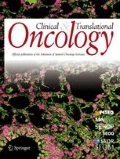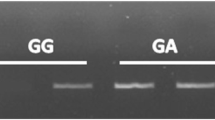Abstract
Introduction
TP53 gene is the most frequently altered tumor suppressor gene in breast cancer. It has been observed that MDM2 plays a central role in regulating the TP53 pathway. This study aimed to investigate the role of TP53 Arg72Pro and MDM2 T309G polymorphisms in breast cancer patients.
Material and method
The TP53 (Arg72Pro) and MDM2 (T309G) polymorphisms were studied in a hospital-based case control study by AS-PCR in 100 breast cancer patients and 100 healthy control subjects.
Results
It was observed that TP53 Arg72Pro polymorphism was significantly associated with breast cancer (χ 2 = 9.92, p = 0.007). A significantly increased breast cancer risk was associated with the Proline allele [odds ratio 1.84 (95 % CI: 1.22–2.77), risk ratio 1.34 (95 % CI: 1.11–1.63), p value 0.003], HER2/neu status (p = 0.01) and distant metastasis (p = 0.05). On the other hand, we have found a significant correlation between MDM2 (T309G) polymorphism with HER2/neu status (χ 2 = 11.14, p = 0.003) and distant metastasis (p value = 0.04).
Conclusion
Our finding suggests that TP53 (Arg72Pro) polymorphism may play a significant role as risk factor for breast cancer in north Indian breast cancer patients. While MDM2 (T309G) polymorphism may not be directly associated with the risk of breast cancer occurrence in the same population, but it may play role in disease progression by triggering TP53.

Similar content being viewed by others
References
Murthy NS, Chaudhary K, Nadayil D, Agarwal UK, Saxena S. Changing trends in incidence of breast cancer: Indian scenario. Indian J Cancer. 2009;46(1):73–4.
Greenblatt MS, Bennett WP, Hollstein M, Harris CC. Mutations in the p53 tumor suppressor gene: clues to cancer etiology and molecular pathogenesis. Cancer Res. 1994;54:4855–78.
Mittal RD, George GP, Mishra J, Mittal T, Kapoor R. Role of functional polymorphisms of P53 and P73 genes with the risk of prostate cancer in a case-control study from Northern India. Arch Med Res. 2011;42(2):122–7.
Oluwagbemiga LA, Oluwole A, Kayode AAR. Seventeen years after BRCA1: what is the BRCA mutation status of the breast cancer patients in Africa?—a systematic review. Springerplus. 2012;1(1):83.
Sinilnikova OM, Antoniou AC, Simard J, Healey S, Léoné M, Sinnett D, et al. The TP53 Arg72Pro and MDM2 309G4T polymorphisms are not associated with breast cancer risk in BRCA1 and BRCA2 mutation carriers. Br J Cancer. 2009;101:1456–60.
Lum SS, Chua HW, Li H, Li WF, Rao N, Wei J, et al. MDM2 SNP309 G allele increases risk but the T allele is associated with earlier onset age of sporadic breast cancers in the Chinese population. Carcinogenesis. 2008;29:754–61.
Kahlenborn C, Modugno F, Potter DM, Severs WB. Oral contraceptive use as a risk factor for premenopausal breast cancer: a meta-analysis. Mayo Clin Proc. 2006;81:1290–302.
Smith TR, Miller MS, Lohman KK, Case LD, Hu JJ. DNA damage and breast cancer risk. Carcinogenesis. 2003;24(5):883–9.
Michael D, Oren M. The p53-Mdm2 module and the ubiquitin system. Semin Cancer Biol. 2003;13:49–58.
Chen J, Wu X, Lin J, Levine AJ. Mdm-2 inhibits the G1 arrest and apoptosis functions of the p53 tumor suppressor protein. Mol Cell Biol. 1996;16:2445–52.
Toledo F, Wahl GM. Regulating the p53 pathway: in vitro hypotheses, in vivo veritas. Nat Rev Cancer. 2006;6:909–23.
Candeias MM, Malbert CL, Powell DJ, Daskalogianni C, Maslon MM, Naski N, et al. p53 mRNA controls p53 activity by managing Mdm2 functions. Nat Cell Biol. 2008;10:1098–105.
Surekha D, Sailaja K, Rao DN, Padma T, Raghunadharao D, Vishnupriya S. Codon 72 and G13964C intron 6 polymorphisms of TP53 in relation to development and progression of breast cancer in India. Asian Pac J Cancer Prev. 2011;12(8):1893–8.
Mitra S, Misra C, Singh RK, Panda CK, Roychoudhury S. Association of specific genotype and haplotype of p53 gene with cervical cancer in India. J Clin Pathol. 2005;58:26–31.
Jain N, Singh V, Hedau S, Kumar S, Daga MK, Dewan R, et al. Infection of Human Papilloma virus type 18 and p53 codon 72 polymorphism in lung cancer patients from India. Chest. 2005;128:3999–4007.
Lakshmi A, Kalyan Kumar C, Mohan Reddy N, Anjaneyulu V, Sadanani MD. P53 codon 72 gene polymorphism and risk of oral squamous cell carcinoma in South Indian population: a case-control study. J Cancer Sci Ther. 2012;4:188–92.
Bond GL, Hu W, Bond EE, Robins H, Lutzker SG, Arva NC, et al. A single nucleotide polymorphism in the MDM2 promoter attenuates the p53 tumor suppressor pathway and accelerates tumor formation in humans. Cell. 2004;119:591–602.
Hong Y, Miao X, Zhang X, Ding F, Luo A, Guo Y, et al. The role of P53 and MDM2 polymorphisms in the risk of esophageal squamous cell carcinoma. Cancer Res. 2005;65:9582–7.
Arva NC, Gopen TR, Talbott KE, Campbell LE, Chicas A, White DE, et al. A chromatin-associated and transcriptionally inactive p53-Mdm2 complex occurs in mdm2 SNP309 homozygous cells. J Biol Chem. 2005;280:26776–87.
Storey A, Thomas M, Kalita A, Harwood C, Gardiol D, Mantovani F, et al. Role of a p53 polymorphism in the development of human papilloma virus-associated cancer. Nature. 1998;393:229–34.
Parkin DM, Bray F, Ferlay J, Pisani P. Estimating the world cancer burden. Int J Cancer. 2001;94:153–6.
Yager JD, Davidson NE. Estrogen carcinogenesis in breast cancer. N Engl J Med. 2006;354(3):270–82.
Veronesi U, Boyle P, Goldhirsch A, Orecchia R, Viale G. Breast cancer. Lancet. 2005;365:1727–41.
Singh V, Rastogi N, Mathur N, Singh K, Singh MP. Association of polymorphism in MDM-2 and p53 genes with breast cancer risk in Indian women. Ann Epidemiol. 2008;18(1):48–57.
Kiruthiga PV, Mohanasundari V, Pravina M, Karutha PS, Pandima DK. p53 exon 4 (codon 72) polymorphism and exon 7 (codon 249) mutation in breast cancer patients in southern region (Madurai) of Tamil Nadu. Asian Pac J Cancer Prev. 2012;13(2):511–6.
Proestling K, Hebar A, Pruckner N, Marton E, Vinatzer U, Schreiber M. The pro allele of the p53 codon 72 polymorphism is associated with decreased intratumoral expression of BAX and p21, and increased breast cancer risk. PLoS One. 2012;7(10):e47325.
Thomas M, Kalita A, Labrecque S, Pim D, Banks L, Matlashewski G, et al. Two polymorphic variants of wild-type p53 differ biochemically and biologically. Mol Cell Biol. 1999;19(2):1092–100.
Dumont P, Leu JI, Della Pietra AC, George DL, Murphy M. The codon 72 polymorphic variants of p53 have markedly different apoptotic potential. Nat Genet. 2003;33:357–65.
Tommiska J, Eerola H, Heinonen M, Salonen L, Kaare M, Tallila J, et al. Breast cancer patients with p53 Pro72 homozygous genotype have a poorer survival. Clin Cancer Res. 2005;11(14):5098–103.
Xu Y, Yao L, Ouyang T, Li J, Wang T, Fan Z, et al. p53 codon 72 polymorphism predicts the pathologic response to neoadjuvant chemotherapy in patients with breast cancer. Clin Cancer Res. 2005;11(20):7328–33.
Szkandera J, Absenger G, Dandachi N, Stotz M, Samonigg H, Gerger A, et al. Analysis of functional germline polymorphisms for prediction of response to anthracycline-based neoadjuvant chemotherapy in breast cancer. Mol Genet Genom. 2012;287:755–64.
Boersma B, Howe T, Goodman J, Yfantis H, Lee D, Chanock S, et al. Association of breast cancer outcome with status of p53 and MDM2 SNP309. J Natl Cancer Inst. 2006;98:911–9.
Petenkaya A, Bozkurt B, Akilli O, Seda Kaya H, Gur Dedeoglu B, Yulug IG. Lack of association between the MDM2-SNP309 polymorphism and breast cancer risk. Anticancer Res. 2006;26:4975–8.
Wilkening S, Bermejo JL, Burwinkel B, Klaes R, Bartram CR, Meindl A, et al. The single nucleotide polymorphism IVS1 + 309 in mouse double minute 2 does not affect risk of familial breast cancer. Cancer Res. 2006;66(2):646–8.
Krekac D, Brozkova K, Knoflickova D, Hrstka R, Muller P, Nenutil R, et al. MDM2SNP309 does not associate with elevated MDM2 protein expression or breast cancer risk. Oncology. 2008;74(1–2):84–7.
Ma H, Hu Z, Zhai X, Wang S, Wang X, Qin J, et al. Polymorphisms in the MDM2 promoter and risk of breast cancer: a case-control analysis in a Chinese population. Cancer Lett. 2006;240(2):261–7.
Acknowledgments
The authors thank all the study subjects and Department of surgery, Lok Nayak hospital, New Delhi, for assistance in recruiting the subjects.
Author information
Authors and Affiliations
Corresponding author
Ethics declarations
Conflicts of interest
The authors declare that there is no conflict of interests concerning this paper.
Informed consent
Written informed consent was obtained from all individual participants included in the study.
Additional information
M. Masroor and K. Tanwer have contributed equally to this work.
Rights and permissions
About this article
Cite this article
Yadav, P., Masroor, M., Tanwer, K. et al. Clinical significance of TP53 (R72P) and MDM2 (T309G) polymorphisms in breast cancer patients. Clin Transl Oncol 18, 728–734 (2016). https://doi.org/10.1007/s12094-015-1425-5
Received:
Accepted:
Published:
Issue Date:
DOI: https://doi.org/10.1007/s12094-015-1425-5



